
Henri Matisse Notre-Dame, une fin d’après-midi 1902

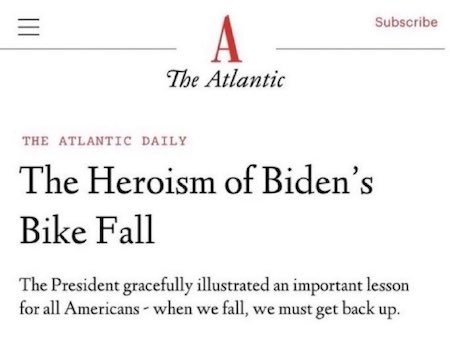

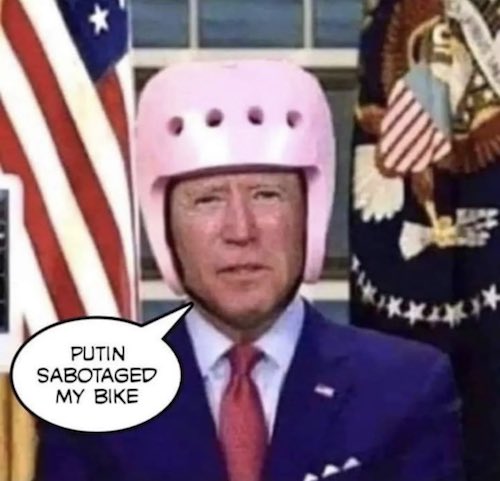

Russell Brand: “The problem with ‘following the science’ is that the science follows the money”
Russell Brand: “The problem with ‘following the science’ is that the science follows the money” pic.twitter.com/U9vQIwZqzC
— Wittgenstein (@backtolife_2022) June 18, 2022

Maersheimer
In 2016, Mearsheimer was asked what the biggest disaster in US foreign policy was. The panelist next to him said Iraq. Here’s his answer. In my business, this is called a crystal ball. pic.twitter.com/pFBnOIJ5Jm
— David Sacks (@DavidSacks) June 19, 2022


He’ll do anything to divert attention from his troubles.
• Boris Urges World Leaders To Hold Their Nerve For A Long War In Ukraine (DM)
Boris Johnson has urged world leaders to hold their nerve for a long war in Ukraine, or risk the ‘greatest victory for aggression in Europe since the Second World War’. In a thinly-veiled barb at Emmanuel Macron’s pleas to ‘make nice’ with warmonger Putin, the Prime Minister has said a Russian victory in Ukraine would be ‘catastrophic’ and urged the international community to use its power to expel Moscow’s invading armies. ‘We’ve got to make it clear that we are supporting the Ukrainians in their ambitions… to expel the Russians, expel Putin’s armies, from everything that he has obtained since February 24, and make sure the Ukrainians are not encouraged to go for a bad peace, something that simply wouldn’t endure.’
Writing in The Sunday Times, Mr Johnson said: ‘Time is now the vital factor. Everything will depend on whether Ukraine can strengthen its ability to defend its soil faster than Russia can renew its capacity to attack. Our task is to enlist time on Ukraine’s side.’ The Tory leader, himself battling inflation spiralling domestic fuel prices, told allies that economic concerns should not lead to a rushed settlement in war-torn Ukraine. Allowing Russia to keep territory in Ukraine ‘would be the greatest victory for aggression in Europe since the Second World War’, Mr Johnson added. [..] Speaking after his second visit to Kyiv, Mr Johnson said: ‘It would a catastrophe if Putin won. He’d love nothing more than to say ”Let’s freeze this conflict, let’s have a ceasefire like we had back in 2014”. For him, that would be a tremendous victory. You’d have a situation in which Putin was able to consolidate his gains and then to launch another attack.
‘We’ve got to make it clear that we are supporting the Ukrainians in their ambitions… to expel the Russians, expel Putin’s armies, from everything that he has obtained since February 24, and make sure the Ukrainians are not encouraged to go for a bad peace, something that simply wouldn’t endure.’ [..] Mr Johnson told Mr Zelensky yesterday that the UK is prepared to launch a major operation to train Ukrainian armed forces, training up to 120,000 troops every 120 days to prepare them for combat against Putin’s soldiers. Mr Johnson said that it was important to prevent the Russians ‘freezing’ the conflict so they could consolidate their gains before mounting another attack.
He said the Ukrainians should be supported in their ambition to regain territory occupied by the Russian forces since they invaded in February. However, he stopped short of calling for the recovery of all the lands Ukraine had lost since 2014 – including Crimea – something Foreign Secretary Liz Truss has previously called for.

No.
• Prepare To Fight Russia In A Third World War – Britain’s Top General (DM)
Britain’s top army general has told his troops to prepare to fight and beat Putin’s armies in a European land war, it has emerged tonight. General Sir Patrick Sanders, who assumed overall command of the British Army this week, warned soldiers ‘we are the generation that must prepare the Army to fight in Europe once again’ as Russia’s invasion of Ukraine rocks global stability. In a tub-thumping message to British troops, he wrote: ‘I am the first Chief of the General Staff since 1941 to take command of the Army in the shadow of a land war in Europe involving a continental power… The scale of the enduring threat from Russia shows we’ve entered a new era of insecurity. ‘It is my singular duty to make our Army as lethal and effective as it can be. The time is now and the opportunity is ours to seize.’
It comes as Putin menaces NATO countries and this week taunted former Soviet states in Europe by declaring: ‘They are part of historic Russia’. Putin made the comments in response to a dramatic statement by Kazakh President Kassym-Jomart Tokayev, who sensationally declared he did not recognise the self-proclaimed people’s republics of Donetsk and Luhansk in eastern Ukraine. Tokayev, sat metres away from the brooding Russian despot at the St Petersburg Economic Forum (SPIEF) yesterday, described the DPR and LPR as ‘quasi-state territories’. ‘We don’t recognise Taiwan, Kosovo, South Ossetia or Abkhazia… we apply this principle to the quasi-state territories, which in our view, are the Luhansk and Donetsk people’s republics’, the Kazakh President said in a daring defiance of Putin’s war in eastern Ukraine.
The Russian President sat quietly, considering Tokayev’s comments, before appearing to deliver a calm but quietly menacing warning. ‘What is the Soviet Union?’ Putin asked rhetorically. ‘This is historic Russia.’ He went on to paint Kazakhstan as a nation friendly to Russia, but quickly added: ‘The same thing could have happened with Ukraine, but they wouldn’t be our allies.’

Provocation, trying to make a bigger war.
• Lithuania Bans Transit Of Sanctioned Russian Goods To Kaliningrad (RFE)
Lithuania has begun a ban on the rail transit of goods subject to European Union sanctions to the Russian far-western exclave of Kaliningrad, transport authorities in the Baltic nation said on June 18. The EU sanctions list includes coal, metals, construction materials, and advanced technology. Anton Alikhanov, the governor of the Russian oblast, said the ban would cover around 50 percent of the items that Kaliningrad imports. Alikhanov said the region, which has an ice-free port on the Baltic Sea, will call on Russian federal authorities to take tit-for-tat measures against the EU country for imposing the ban. He said he would also seek to have more goods sent by ship to the oblast.
The cargo unit of Lithuania’s state railways service set out details of the ban in a letter to clients following “clarification” from the European Commission on the mechanism for applying the sanctions. Previously, Lithuanian Deputy Foreign Minister Mantas Adomenas said the ministry was waiting for “clarification from the European Commission on applying European sanctions to Kaliningrad cargo transit.” The commission stated that sanctioned goods and cargo should still be prohibited even if they travel from one part of Russia to another but through EU territory. [..] Russia’s Baltic Sea exclave of Kaliningrad, sandwiched between Lithuania and Poland, became part of the Soviet Union after World War II. It has a population of about 430,000 people and hosts the headquarters of Russia’s Baltic sea fleet.
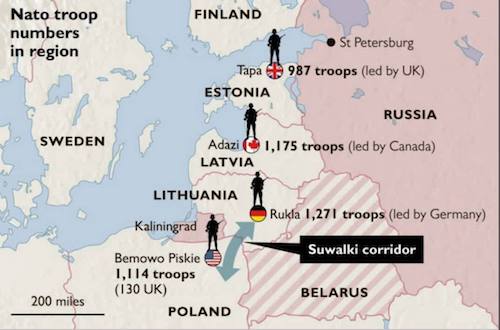

Gonzalo Lira – A message for Americans

“..perpetuate old colonialist behavior well past its use-by date..”
Russia is done with the West. The divorce is nearly complete. In the past few days we’ve heard from all major Russian leaders the same thing, “The West will play by our rules now.” You can decide for yourselves whether Russia is writing checks they can’t cash, but in the words of Foreign Minister Sergei Lavrov telling the BBC bluntly, “We do not care about the eyes of the West.” Lavrov has always been the soul of politeness and discretion when dealing with European media. His open hostility towards his BBC interviewer was not only palpable, it was hard to argue with. He followed that up with: “I don’t think there’s even room for maneuver left anymore,” Lavrov replied. “Because both [Prime Minister Boris] Johnson and [Foreign Secretary Liz] Truss say publicly: ’We must defeat Russia, we must bring Russia to its knees. Go on, then, do it.”
Russia’s leadership never talks in such openly blunt terms. It’s almost like Lavrov was channeling comedian Dennis Miller who used to say, “Feeling froggy, take that leap.” See where it gets you. Russia knows it has the West on the ropes. We need what they produce and now they are determined to set the rules on who gets them and for what price. It knows that European leaders are puppets with Klaus Schwab’s hand up their asses. And it knows Davos has zero leverage over Russia’s actions from here on out. Which brings me to the statements linked above by Gazprom CEO Alexei Miller, speaking at a panel at the St. Petersburg Economic Investment Forum (SPEIF) who just put the situation in the starkest terms there is.
“The game of nominal value of money is over, as this system does not allow to control the supply of resources. …Our product, our rules. We don’t play by the rules we didn’t create.” Miller’s statement should be thought of as a statement of principle across all theatres of operation for Russia. This doesn’t just apply to natural gas or oil. This is everything, all of Russia’s dealings with the West from here on out will be on its terms not the West’s. This is clearly the biggest geopolitical middle finger in the post WWII period. Miller is clearly laying out the rules for a new, commodity-centric monetary system, one based on what Credit Suisse’s Zoltan Poszar called ‘outside money’ — commodities, gold, even bitcoin — rather than the West’s egregious use of ‘inside money’ — debt-based fiat and credit — to perpetuate old colonialist behavior well past its use-by date.

Much more here from Pepe. Do read.
• St. Petersburg Sets The Stage For The War of Economic Corridors (Escobar)
The St. Petersburg International Economic Forum has been configured for years now as absolutely essential to understand the evolving dynamics and the trials and tribulations of Eurasia integration. St. Petersburg in 2022 is even more crucial as it directly connects to three simultaneous developments I had previously outlined, in no particular order: First, the coming of the “new G8” – four BRICS nations (Brazil, Russia, India, China), plus Iran, Indonesia, Turkey and Mexico, whose GDP per purchasing parity power (PPP) already dwarfs the old, western-dominated G8. Second, the Chinese “Three Rings” strategy of developing geoeconomic relations with its neighbors and partners. Third, the development of BRICS+, or extended BRICS, including some members of the “new G8,” to be discussed at the upcoming summit in China.
There was hardly any doubt President Putin would be the star of St. Petersburg 2022, delivering a sharp, detailed speech to the plenary session. Among the highlights, Putin smashed the illusions of the so-called ‘golden billion’ who live in the industrialized west (only 12 percent of the global population) and the “irresponsible macroeconomic policies of the G7 countries.” The Russian president noted how “EU losses due to sanctions against Russia” could exceed $400 billion per year, and that Europe’s high energy prices – something that actually started “in the third quarter of last year” – are due to “blindly believing in renewable sources.” He also duly dismissed the west’s ‘Putin price hike’ propaganda, saying the food and energy crisis is linked to misguided western economic policies, i.e., “Russian grain and fertilizers are being sanctioned” to the detriment of the west.
In a nutshell: the west misjudged Russia’s sovereignty when sanctioning it, and now is paying a very heavy price. Chinese President Xi Jinping, addressing the forum by video, sent a message to the whole Global South. He evoked “true multilateralism,” insisting that emerging markets must have “a say in global economic management,” and called for “improved North-South and South-South dialogue.” It was up to Kazakh President Tokayev, the ruler of a deeply strategic partner of both Russia and China, to deliver the punch line in person: Eurasia integration should progress hand in hand with China’s Belt and Road Initiative (BRI).
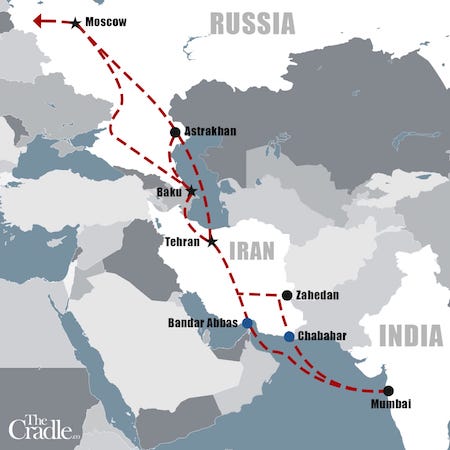
The International North South Transportation Corridor (INSTC)

More intensified than started.
• OSCE: Ukraine Started Shelling Donbas Nine Days Before Russian Attack (KK)
It is important to remember that the armed conflict in eastern Ukraine started in 2014 after the Obama administration and U.S. Congress members installed a new government in Ukraine, in what the head of the “private CIA” firm Stratfor called “the most blatant coup in history.” In response to the U.S.-backed coup, the Luhansk and Donetsk regions in the Donbas held a referendum on seceding from Ukraine, in which 96% of Luhansk and 89% of Donetsk voted for the creation of two new self-described independent republics in eastern Ukraine. Moscow said the vote reflected the “will of the people,” but the EU called the elections “illegal and illegitimate”, which quickly turned violent and descended into an all-out conflict between the Ukrainian military and Russian-backed separatist forces of Luhansk and Donetsk.
Between 2014 and 2022 the War in Donbas killed an estimated 14,000 people, forcing millions of people to flee the region, and turning the conflict zone into one of the world’s most mine-contaminated areas. The Organization for Security and Cooperation in Europe (OSCE) has had observers on-the-ground monitoring the situation in Donbas since the outbreak of open conflict began in 2014. The OSCE has been the only international civilian observer mission allowed to collect information from both sides of the contact line, and its data, while incomplete, remains the best available. The OSCE observer mission provides maps in daily reports documenting the location of ceasefire violations and explosions along the contact line between the Ukrainian military and the Donbas republics.
These maps clearly show that Ukraine began artillery strikes against the Donbas republics on February 16th, 2022. In other words, Ukraine began shelling the independent republics of Donetsk and Luhansk nine days before Russia announced its ‘special military operation’ in Ukraine. While the western corporate media remained completely silent, explosions documented by the OSCE increased from 76 on February 15th, to 316 on February 16th, to 654 on February 17th, and to 1,413 on February 18th. When you look carefully at the daily maps of these explosions, it is clear that the vast majority of explosions occurred on the Russian separatist side of the ceasefire line.
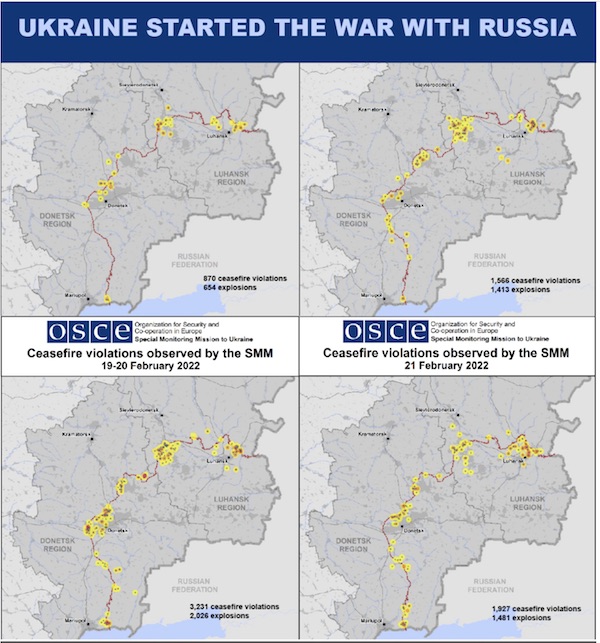
Feb 14: 174 ceasefire violations, 41 explosions
Feb 15: 153 ceasefire violations, 76 explosions
Feb 16: 509 ceasefire violations, 316 explosions
Feb 17: 870 ceasefire violations, 654 explosions
Feb 18: 1,566 ceasefire violations, 1,413 explosions
Feb 19-20: 3,231 ceasefire violations, 2,026 explosions
Feb 21: 1,927 ceasefire violations, 1,481 explosions
Feb 21: Russia recognizes independence of Donetsk and Luhansk
Feb 22: 1,710 ceasefire violations, 1,420 explosions
Feb 24: Russia launches ‘special military operation’

All 27 countries will agree? Can’t see it.
• Ukraine’s EU Accession Plan Is a Suicide Pill for Desperate EU (Jay)
It might take a decade for Ukraine to even join the EU club, but Macron and others are upbeat about Ukraine becoming an EU member state, ahead of a key vote by all 27-member states in Brussels. In reality, the grandiose, if not desperate move pushed by the French president, won’t go through as at least three member states have said already that they won’t back it. But what’s the real story behind this somewhat banal plan to make Ukraine a member of the European Union? Is there a hidden agenda? Well of course there is. It is simply that in 2028 Macron is hotly tipped to be running the EU. In this year, two top jobs will become vacant in Brussels – European Commission President and European Council of Ministers chief – and he is an obvious choice to take one of them.
Macron’s dream is that before then, France takes a leading role – if not the leading role – within the EU and that the bloc’s so-called ‘foreign policy’ is more or less run by him and his team. So what’s the link? In a nutshell, federalists like Macron dream of an EU which punches above its weight and despite the Maastricht treaty in 1992 and the Lisbon Treaty in 2007, the EU’s efforts to garner more power away from member states towards Brussels haven’t amounted to much in practical terms. On paper, the EU has a considerable amount of clout on the international circuit in terms of peacekeeping and humanitarian stuff. You know the sort of thing.
But in real terms whenever the EU wants to actually soldier ahead with something big, right at the last moment member states themselves hold back from pressing the button and block the move. This explains why only a couple of weeks into the Ukraine war, Macron himself went in person to visit Putin while the EU’s top diplo wonk, Josep incredibly-boring Borrell went to Washington to give a joint press conference with his left-wing US president. That tells you all you need to know about the EU’s real powers when it comes to the international stage. The EU’s top foreign policy chief didn’t go to Moscow as probably Putin wouldn’t have received him as, to be fair, Borrell hasn’t really much to say and no real power to do anything.

mRNA affects both men and women’s reproductive systems.
https://onlinelibrary.wiley.com/doi/10.1111/andr.13209
• Pfizer’s mRNA Jabs “Temporarily” Impair Semen Concentration’ (Wiley)
37 semen donors from three sperm banks that provided 220 samples, were included in that retrospective longitudinal multicenter cohort study. BNT162b2 vaccination included two doses, and vaccination completion was scheduled 7 days after the second dose. The study included four phases: T0 – pre-vaccination baseline control, which encompassed 1–2 initial samples per SD; T1, T2 and T3 – short, intermediate, and long terms evaluations, respectively. Each included 1–3 semen samples per donor provided 15–45, 75-120, and over 150 days after vaccination completion, respectively. The primary endpoints were semen parameters. Three statistical analyses were conducted: 1) generalized estimated equation model; 2) first sample and 3) samples’ mean of each donor per period were compared to T0.
Repetitive measurements revealed -15.4% sperm concentration decrease on T2 (CI -25.5%–3.9%, p = 0.01) leading to total motile count 22.1% reduction (CI -35% – -6.6%, p = 0.007) compared to T0. Similarly, analysis of first semen sample only and samples’ mean per donor resulted in concentration and TMC reductions on T2 compared to T0 – median decline of 12 million/ml and 31 million motile spermatozoa, respectively (p = 0.02 and 0.002 respectively) on first sample evaluation and median decline of 9.5◊106 and 27.3 million motile spermatozoa (p = 0.004 and 0.003, respectively) on samples’ mean examination. T3 evaluation demonstrated overall recovery. Semen volume and sperm motility were not impaired.

El Gato’s take on the study above.
• Pfizer Vaccine Effects On Total Motile Count In Sperm Donors (El Gato)
these mRNA drugs are broadly systemic and concentrate in (amongst others) reproductive organs and effects on menstrual cycles are widely documented. In light of this quite worrying fact (especially with a compound carrying high CG enrichment relative to high virus and the attendant risks thereof) it has been surprising to me that there have no been more studies on this topic. But a few are starting to emerge. this israeli study was published 2 days ago: and the results are, well, nuts. (sorry). There was strong a priori reason to suspect effects, especially in light of the higher and more persistent prevalence of vaccine induced S proteins vs natural infection and the CG enrichment issued mentioned above.
“Over the first pandemic months, there was insufficient data regarding the possible impact of Covid-19 on human reproduction. Yet, it was clear it employs the Angiotensin-Converting Enzyme 2 (ACE2) receptor for cellular entry. Various testicular cells including Leydig, Sertoli, spermatogonia and spermatozoa express ACE2 and related proteases resulting with viral fusion. Cytokine storm-induced dysfunction, autophagy regulation and damaged blood-testis barrier were also suggested as possible pathogenic mechanism for testicular damage. Clinical reports of orchitis, supported by histological findings, further emphasized testicular involvement. Therefore, detrimental impact on both spermatogenesis and testosterone production 10 seem an obvious outcome they evaluated donors from 3 sperm banks over a longitudinal period commencing before pfizer vaccine and following up after.”
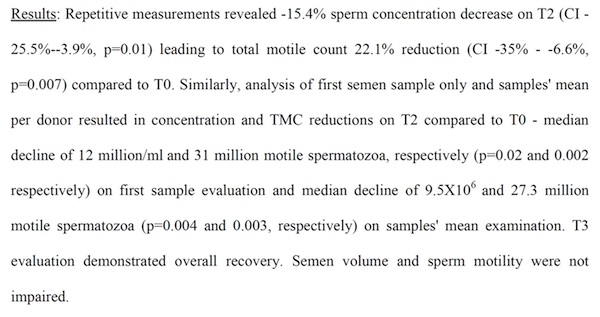
“Conclusions: Systemic immune response after BNT162b2 vaccine is a reasonable cause for transient semen concentration and TMC decline. Long-term prognosis remains good”. But i am left wondering about these claims and fear they may provide an example of the sort of “nerf or refute your own findings in the abstract so that we can publish this without massive controversy” behavior that has become all too common in medical and scientific journals who withhold peer review from those whose findings look too worrying if stated plainly. (but that will often let such data out if buried deep in supplements and appendixes).
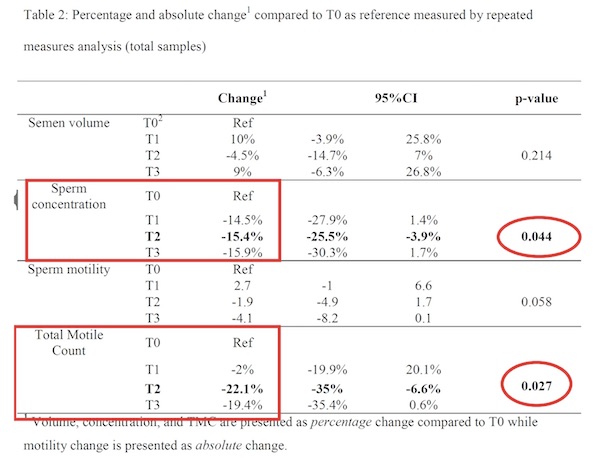
I’m struggling to see how one could call this “recovery.” Post day 150, sperm concentration was -15.9% vs baseline, lower even than in the 75-120 day period. Average time post vaxx for T3 collection was 174 +/- 26.8 days so we’re talking about 6 months post vaxx with NO recovery in sperm concentration. Total motile count was slightly recovered from T2, but was still down 19.4% vs baseline, seeming to make up somewhat in volume what is lost in concentration.

Cabal.
• FDA Unanimously Approve Covid Vaccine For 0-4 Years (HART)
The FDA met on 15th June and despite all the evidence of non-efficacy from the infant Pfizer vaccine and the still total lack of data on long-term harms, they voted to go ahead. If the last eighteen months are anything to go by, the MHRA will follow soon, followed after a respectable few weeks by the JCVI. Indeed, vaccination for this age-group is already listed for JCVI discussion. Before the UK regulators make any decision, they would do well to read a detailed letter to the FDA from Senator Robert F Kennedy.
It was depressing that in the FDA open meeting, none of the members pointed out that 2 months follow-up is totally inadequate for assessing safety, nor questioned the use of an antibody level as a measure of success. No specific level of antibody exists which provides protection against covid so how can this be used as a useful measure? For young children, much of their reduced risk from covid arises from their superior innate immunity. In the presentation to the FDA, Pfizer presented evidence that the only antibodies produced in the children were to the Wuhan spike with no detectable antibodies to the Omicron spike. Moderna was also authorised for children at the same meeting, despite several countries having dropped it for all under 30s. Their lengthy document (189 pages of single-spaced typing) was only sent to members two working days ahead of the meeting.
But what of the Pfizer data on which the decision was apparently based? The Pfizer submission must be the most extreme case of data manipulation and bad science ever presented to the FDA. The study was approved on the basis of 4,500 participants but 3,000 of them did not make it to the end of the trial. That alone is enough to make the findings null and void. There are three other measures that were used to assess efficacy: total covid, ‘severe’ covid and hospitalisations. The researchers found that there were 30% more covid cases in the vaccine arm in the three weeks after first dose, so they ignored that data. They also ignored the data after the second dose where there was no benefit. They then ignored a full week after the third dose too.
In total 97% of the covid cases in the trial were ignored. Finally, they focused on 7 cases in the placebo arm more than a week after vaccination and 3 in the vaccine arm and on the basis of those tiny numbers over that very short period, they claimed efficacy. Pfizer described this issue thus: “Vaccine efficacy post Dose 3 cannot be precisely estimated due to the limited number of cases accrued during blinded follow-up, as reflected in the wide confidence intervals associated with the estimates.”
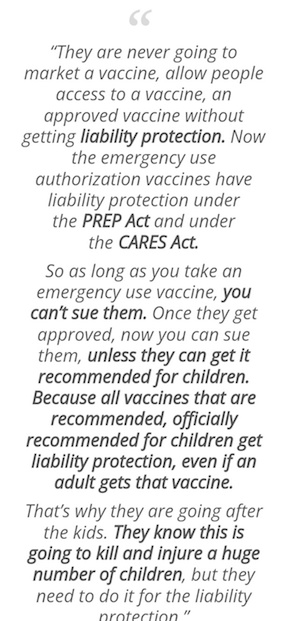

“Pfizer study used just THREE children to prove it works..”
• Experts Question CDC’s Approval Of Covid Vaccines For Under-5s (DM)
In the wake of the CDC’s approval of Pfizer and Moderna’s Covid-19 vaccine for babies as young as six months, at least one expert has questioned the move. Dr. Sarah Long, an infectious diseases expert at the Drexel University College of Medicine, told the New York Times: ‘We should just assume that we don’t have efficacy data.’ That comes off the back of Pfizer’s own reporting that said their statements of 80% effectiveness in children under five was based on the responses of just three children. Those children were part of a group of ten but seven were given a placebo. And there are also concerns about the Moderna shot, which is only between 37 per cent and 51 per cent effective, depending on the age of the child receiving it.
According to the Times report, the CDC noted in their meeting this past Friday on whether or not to approve the vaccines that Pfizer’s metric was unreliable. Dr. Long said that despite this she was ‘comfortable enough’ in approving the vaccines based on other data. Both Moderna and Pfizer’s vaccines were shown to have a success rate of around 95% in adults. However in Moderna’s case, that number is just 37% in children aged two through five. The shot is effective in 51 per cent of children aged between six months and 23 months. Earlier in June 2022, FDA advisors met to discuss new vaccines to deal with new mutations of Covid-19. Public health authorities have expressed a worry that a new mutation in the latter part of the year, could undermine vaccines, reports CNBC.
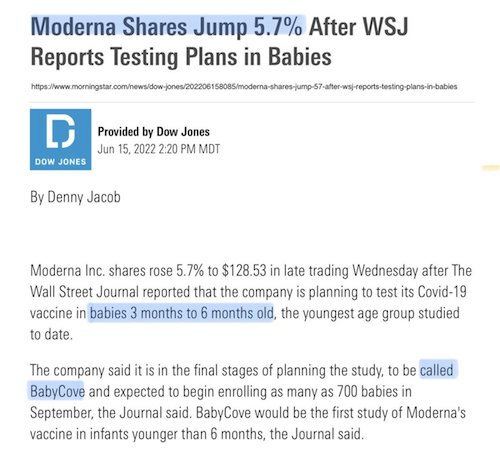

Coming full circle.
• Germany Turns To Coal For Electricity Amid Gas Shortage Concerns (JTN)
Germany plans on limiting the use of natural gas and increasing the use of coal to generate electricity over concerns about a possible gas shortage as Russia cuts supplies, according to German Economy Minister Robert Habeck. “That’s bitter, but it’s simply necessary in this situation to lower gas usage,” Habeck, an environmentalist Green party member, said, the Associated Press reported. Russia’s majority state-owned Gazprom announced plans last week to sharply reduce gas to the Nord Stream 1 pipeline. Although the company cited technical reasons, Haebeck said the move appeared political. Germany has been scaling back gas imports because of Russia’s invasion of Ukraine in February.
The nation was attempting to phase out coal-generated power. Germany is set to shut down its last coal-fired power plant no later than 2038, The German government is asking citizens to reduce their energy use due to the supply situation. The European country is hoping to fill its gas storage facilities to 90% capacity by this fall in order to ensure heat throughout the winter. The facilities are currently at less than 60% capacity.

“Macron’s Ensemble coalition is on track to win 245 seats, down from 345 in the outgoing chamber..”
• Macron Faces 5 Years Of Gridlock After Stunning Parliamentary Defeat (Pol.eu)
French President Emmanuel Macron is set to face a potentially tumultuous five years of deadlock after his centrist alliance fell short of an absolute majority in a parliamentary runoff on Sunday, just weeks after he was reelected to the Elysée. Voters massively came out in support of the far-right National Rally and the left-wing coalition NUPES, depriving Macron of a ruling majority. With almost all votes counted, Macron’s Ensemble coalition is on track to win 245 seats, down from 345 in the outgoing chamber. NUPES, led by the far-left firebrand Jean-Luc Mélenchon is set to win 141 seats, while Marine Le Pen’s National Rally will likely walk away with 89 seats. The runoff vote determines the composition of the National Assembly, the parliament’s lower chamber.
In the first round of voting last Sunday, Macron’s coalition of parties was neck and neck with the NUPES alliance, sparking concern among some in Macron’s camp that the French president’s popularity was sharply in decline. On Sunday, Macron’s supporters were left reeling after several party big guns, including the speaker of the National Assembly Richard Ferrand and Christophe Castaner, Macron’s party whip in the outgoing chamber, lost their seats. Health Minister Brigitte Bourguignon and Environment Minister Amélie de Montchalin also lost their seats — which will likely force their resignations, as has been convention since the Sarkozy era. The newly appointed Prime Minister Elisabeth Borne, who won her seat in Normandy with a slim majority, said Ensemble would work to broaden its support in parliament and build a “majority of action.”

“in the end the Americans can’t say no [to his release], given that President Obama commuted the sentence of Chelsea Manning for exposing the very war crime that Assange went on to publicise worldwide”
• Australia Government Lobbying Behind The Scenes For Assange’s Freedom (SMH)
The federal government is lobbying US counterparts behind the scenes to secure the freedom of WikiLeaks founder Julian Assange, after the United Kingdom’s decision to approve his extradition to the United States. The Trump administration brought charges against Assange under the Espionage Act relating to the leaking and publication of the WikiLeaks cables a decade ago. The UK Home Office announced late on Friday (AEST) that “after consideration by both the Magistrates Court and High Court, the extradition of Julian Assange to the US was ordered”. “In this case, the UK courts have not found that it would be oppressive, unjust or an abuse of process to extradite Mr Assange. “Nor have they found that extradition would be incompatible with his human rights, including his right to a fair trial and to freedom of expression, and that whilst in the US he will be treated appropriately, including in relation to his health.”
Assange’s legal team has 14 days to appeal the decision to the High Court and will do so while he remains in Belmarsh prison. Prime Minister Anthony Albanese, while still opposition leader in December, said “enough is enough” and that it was time for Assange to be returned to Australia. Asked about Assange’s extradition on Saturday, he told The Sun-Herald and The Sunday Age that he stood by the comments he made in December. At the time, Albanese said “he [Assange] has paid a big price for the publication of that information already. And I do not see what purpose is served by the ongoing pursuit of Mr Assange”. Albanese met US President Joe Biden at the Quad meeting in Tokyo in late May, days after the federal election, but there has been no indication that he raised the Assange matter with him during their meeting.
A source in the federal government, who asked not to be named so they could discuss the matter, has confirmed to The Sun-Herald and The Sunday Age that Assange’s case has been raised with senior US officials. Former foreign minister Bob Carr said the discussions over Assange’s release would be “governed by sensitive, nuanced alliance diplomacy appropriate between partners”. “I trust the judgment of Prime Minister Albanese on this, given his recent statement cautioning against megaphone diplomacy and his comments last December,” he said. But Carr predicted that “in the end the Americans can’t say no [to his release], given that President Obama commuted the sentence of Chelsea Manning for exposing the very war crime that Assange went on to publicise worldwide”. “The Yank has had her sentence commuted; the Aussie faces an extradition and a cruel sentencing.



Hinton Oliver
USA approves gene based products for 6 month old babies. I discussed my thoughts with Neil Oliver @thecoastguy on @GBNEWS #covid19 #pfizer #moderna #canwetalkaboutit pic.twitter.com/qFLkjwSH36
— Dr Anthony Hinton GETTR @DrTonyHinton (@TonyHinton2016) June 19, 2022

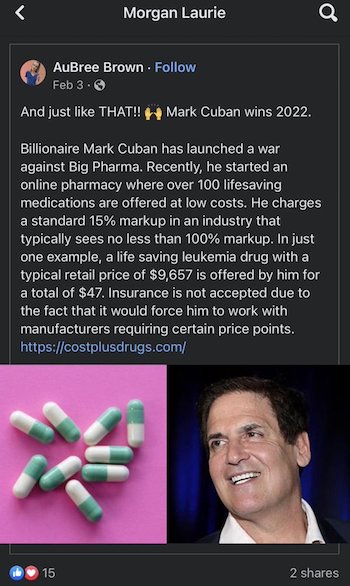

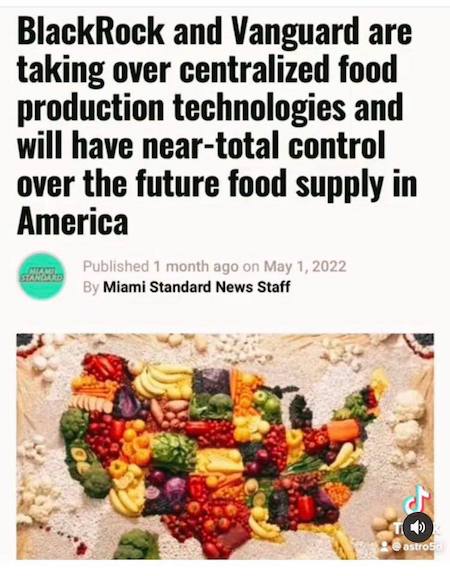

Sound On
Been watching this on repeat this weekend – definitely have the sound on pic.twitter.com/VgU6Z4gsUp
— Saman Shad (@muminprogress) June 19, 2022

Support the Automatic Earth in virustime with Paypal, Bitcoin and Patreon.










Home › Forums › Debt Rattle June 20 2022